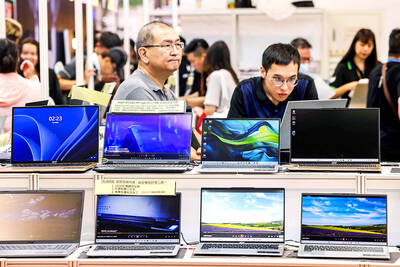South Korea’s automakers reported record sales in China last month while Japanese manufacturers posted declines after anti-Japan protests over disputed islands escalated in the world’s largest vehicle market.
Hyundai Motor Co, South Korea’s biggest automaker, and its affiliate Kia Motors Corp, sold a combined 127,827 vehicles, compared with the previous record of 116,763 units in September last year, Hyundai said in an e-mailed statement yesterday. The Seoul-based companies expect to exceed their sales target of 1.25 million units for this year, it said.
CONFLICT
A conflict over ownership of islands claimed by Taiwan, China and Japan led to demonstrations in some Chinese cities last month in which Japanese-branded cars were smashed and showrooms torched. Toyota Motor Corp, Japan’s largest producer, saw sales in China fall 50 percent last month from the previous month, the Yomiuri Shimbun reported on Friday, while Mazda Motor Corp said its deliveries in the nation dropped 35 percent from a year earlier.
“Anti-Japan sentiments in China began to affect car sales from September, and [South] Korean carmakers were one of the beneficiaries with other global companies,” said Eric Choi, a Seoul-based auto analyst at Shinhan Investment Corp.
SALES
Last month’s sales in China of Hyundai Motor and Kia Motors were driven by the Langdong and K2 models respectively, according to the statement. The Langdong had sales of 15,243 units, compared with more than 10,000 in its debut in August while Kia sold a record 15,656 units of K2.
Hyundai’s venture in China, Beijing Hyundai Motor Co, was the nation’s fourth-largest passenger-car maker in August, with sales of 63,400 units, according to association data. The biggest was Volkswagen AG’s venture FAW-Volkswagen Automotive Co, with 114,700 units.

TECH TITAN: Pandemic-era demand for semiconductors turbocharged the nation’s GDP per capita to surpass South Korea’s, but it still remains half that of Singapore Taiwan is set to surpass South Korea this year in terms of wealth for the first time in more than two decades, marking a shift in Asia’s economic ranks made possible by the ascent of Taiwan Semiconductor Manufacturing Co (TSMC, 台積電). According to the latest forecasts released on Thursday by the central bank, Taiwan’s GDP is expected to expand 4.55 percent this year, a further upward revision from the 4.45 percent estimate made by the statistics bureau last month. The growth trajectory puts Taiwan on track to exceed South Korea’s GDP per capita — a key measure of living standards — a

READY TO HELP: Should TSMC require assistance, the government would fully cooperate in helping to speed up the establishment of the Chiayi plant, an official said Taiwan Semiconductor Manufacturing Co (TSMC, 台積電) yesterday said its investment plans in Taiwan are “unchanged” amid speculation that the chipmaker might have suspended construction work on its second chip packaging plant in Chiayi County and plans to move equipment arranged for the plant to the US. The Chinese-language Economic Daily News reported earlier yesterday that TSMC had halted the construction of the chip packaging plant, which was scheduled to be completed next year and begin mass production in 2028. TSMC did not directly address whether construction of the plant had halted, but said its investment plans in Taiwan remain “unchanged.” The chipmaker started

MORTGAGE WORRIES: About 34% of respondents to a survey said they would approach multiple lenders to pay for a home, while 29.2% said they would ask family for help New housing projects in Taiwan’s six special municipalities, as well as Hsinchu city and county, are projected to total NT$710.65 billion (US$23.61 billion) in the upcoming fall sales season, a record 30 percent decrease from a year earlier, as tighter mortgage rules prompt developers to pull back, property listing platform 591.com (591新建案) said yesterday. The number of projects has also fallen to 312, a more than 20 percent decrease year-on-year, underscoring weakening sentiment and momentum amid lingering policy and financing headwinds. New Taipei City and Taoyuan bucked the downturn in project value, while Taipei, Hsinchu city and county, Taichung, Tainan and Kaohsiung

Micro-Star International Co (MSI, 微星科技) is expanding notebook computer production in India after partnering with Indian electronics maker Syrma SGS Technology Ltd late last year, as the Taiwanese company seeks to tap into the local market. MSI also plans to manufacture some of its new gaming PCs powered by Nvidia Corp’s RTX 50 graphics cards in India, while adding more advanced and design-focused PCs and notebooks at Syrma’s plant in Chennai, a source told the Taipei Times yesterday on condition of anonymity. MSI’s deployment in India is driven not only by cost advantages, but also by India’s rapidly expanding consumer market and